The aging population has many unique health and care concerns, and there’s a growing demand for adult gerontology nurse practitioner (AGNP) professionals.

Technically speaking, gerontology is the practice of caring for patients throughout adulthood, from adolescence to the senior years. Many geriatric nurse practitioner programs, though, focus on the particular skills that can specifically benefit the aging population.
Editorial Listing ShortCode:
From exploring the physical and mental impact of the aging process to senior-specific care, AGNP programs are designed for nursing professionals who want to provide care for the elderly.
Universities Offering Online MSN in Adult Gerontology Nurse Practitioner Degree Programs
Methodology: The following school list is in alphabetical order. To be included, a college or university must be regionally accredited and offer degree programs online or in a hybrid format.
Drexel University
Drexel University offers an MSN in Adult Gerontology that can be earned primarily online, with mandatory on campus intensives and supervised clinical experiences. Drexel’s academic calendar has four 10 week quarters each year. The program requires the completion of 52 quarter credits of courses such as Advanced Pathophysiology, Advanced Pharmacology, and Research Methods and Biostatistics.
Drexel University is accredited by the Middle States Commission on Higher Education.
Franklin University
Franklin University’s Adult-Gerontology Primary Care Nurse Practitioner degree program requires the completion of 41 credit hours, which can typically be done in about 27 months. The program teaches how to care for patients over the age of 65 through a combination of clinical experience and online coursework. Courses are taught by instructors with real-world experience.
Franklin University is accredited by the Higher Learning Commission.
George Washington University
George Washington University offers a Master of Science in Nursing in Adult-Gerontology Primary Care Nurse Practitioner. Students can enroll full-time or part-time and participate in clinical practicums in their communities while completing coursework online. There are some on-campus experiences required to receive faculty mentorship and meet other students.
George Washington University is accredited by the Middle States Commission on Higher Education.
La Salle University
La Salle University’s Master of Science in Nursing Adult-Gerontology Primary Care Nurse Practitioner program is available online. The program requires the completion of 41 credit hours, which can typically be done 20 to 36 months. The curriculum is designed to prepare students for the American Nurses Credentialing Center exam and the American Association of Nurse Practitioners exam.
La Salle University is accredited by the Middle States Commission on Higher Education.
Regis College
Regis College offers an Adult-Gerontology Primary Care Nurse Practitioner program. To graduate, students must complete a total of 46 to 61 credits, which can typically be done in 28 to 36 months. Coursework is online and designed to provide a flexible learning environment. Graduates of the program are eligible to sit for the AANP and ANCC certification exams.
Regis College is accredited by the New England Commission of Higher Education.
Seton Hall University
Seton Hall University has an online MSN Adult Gerontology Nurse Practitioner program. The program requires the completion of 48 credits, which can typically be done in 3 to 4 years. Students can choose between Primary Care and Acute Care tracks. The curriculum is designed to prepare students for the ANCC and AANPCB exams.
Seton Hall University is accredited by the Middle States Commission on Higher Education.
South University
South University offers an online program for a Master of Science in Nursing with a specialization in Adult-Gerontology Primary Care Nurse Practitioner. The program can potentially be completed in 2 years, and past students have had a 75% pass rate on the AANP exam. The program requires the completion of 56 credit hours.
South University is accredited by the Southern Association of Colleges and Schools Commission on Colleges.
University of Cincinnati
The University of Cincinnati offers an MSN Adult-Gerontology Primary Care Nurse Practitioner program intended for students who already have at least 1 year of experience working as an RN. The program is designed to be flexible and can typically be completed in 2 years. Coursework is 100% online.
The University of Cincinnati is accredited by the Higher Learning Commission.
Walden University
Walden University’s Master of Science in Nursing Adult-Gerontology Acute Care Nurse Practitioner program is available online. Classes include virtual meetings and discussions with classmates and faculty. Walden also provides support services to help students find practicum placements. The curriculum is designed to prepare students for the ANCC board certification exam.
Walden is accredited by the Higher Learning Commission.
Wilkes University
Wilkes University offers an online program for an Adult-Gerontology Primary Care Nurse Practitioner MSN. The program requires two residency visits and 500 clinical hours. Students can get support in finding clinical placements. There are three start dates offered each year, and students can typically finish the program in 2 years.
Wilkes University is accredited by the Middle States Association of Colleges and Schools.
Online Adult Gerontology Nurse Practitioner Programs

A geriatric NP is skilled in providing care for, advocating for, and communicating with aging patients. Within online adult gerontology nurse practitioner programs, there are two main areas of concentration: acute care and primary care.
You may wish to review the many available nurse practitioner programs offered to determine which specialization is the best fit for you. Select the program that most interests you to jump to that section of the guide:
- MSN in Adult Gerontology Acute Care Nurse Practitioner
- MSN in Adult Gerontology Primary Care Nurse Practitioner
You can explore these programs, along with the online accelerated nursing programs that a number of universities offer, to see which ones best match your interests and goals.
MSN in Adult Gerontology Acute Care Nurse Practitioner (AGACNP)

Acute care is focused on serious health conditions. Nurse practitioners who follow this path often work in specialized fields, such as cardiology, trauma treatment, oncology, or surgical scenarios. Professionals with the AGACNP designation are frequently found in emergency rooms, hospitals, and intensive care units.
Due to the rigorous course of study for AGACNP programs, these nurse practitioners are often permitted to make basic diagnoses as well as administer and prescribe common prescriptions. They can also be an instrumental part of a care team for patients with chronic conditions.
MSN in Adult Gerontology Primary Care Nurse Practitioner (AGPCNP)
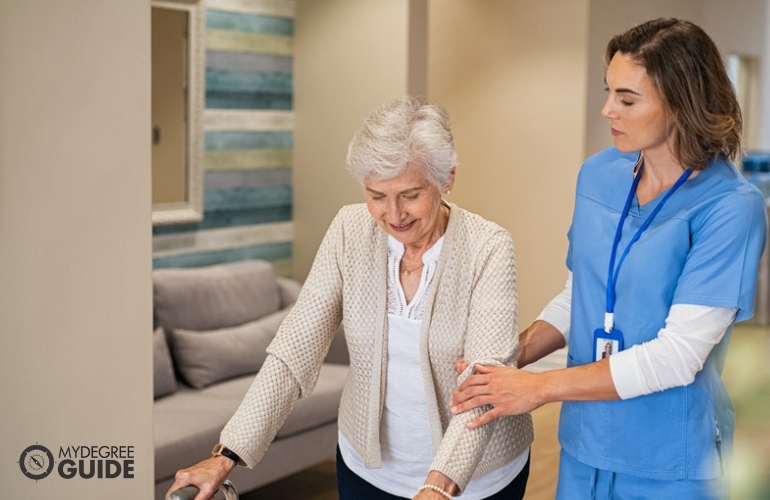
An adult gerontology primary care nurse practitioner will most likely work within a primary care facility, such as a family doctor’s office or community clinic. They may also work in care or rehabilitation centers.
In a primary care setting, patients will receive regular periodic care for ongoing issues, though many patients will visit for preventive care to maintain a healthy lifestyle. AGPCNPs can provide education and care options, and they can follow up with patients on a care program.
Generally speaking, an AGPCNP does not have a particular specialty. Instead, they are well-versed in diseases, injuries, and ailments that are common through the aging process.
Geriatrics and Gerontology Careers & Salaries
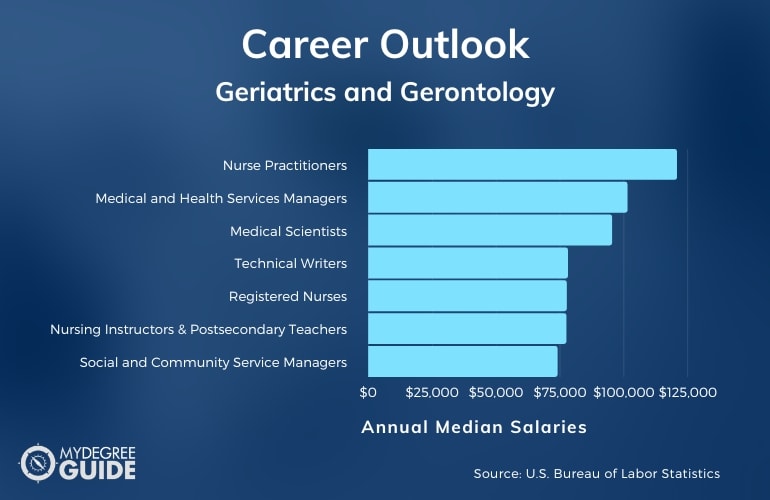
Many of those who graduate from geriatric nurse practitioner programs become AGNPs who work in acute care or primary care. Employment opportunities for nurse practitioners are anticipated to grow by an astounding 46% over the next ten years (Bureau of Labor Statistics).
According to the Bureau of Labor Statistics, here are the median salaries for some of the career paths related to the study of gerontology NP.
| Careers | Annual Median Salaries |
| Nurse Practitioners | $120,680 |
| Medical and Health Services Managers | $101,340 |
| Medical Scientists | $95,310 |
| Technical Writers | $78,060 |
| Registered Nurses | $77,600 |
| Nursing Instructors and Postsecondary Teachers | $77,440 |
| Social and Community Service Managers | $74,000 |
| Healthcare Social Workers | $60,840 |
| Health Education Specialists | $60,600 |
| Community Health Workers | $46,590 |
There are many areas in which those interested in geriatrics and gerontology can focus their education and career to benefit the elderly and aging populations.
Some nurse practitioners pursue leadership roles, working as nurse managers or healthcare facility administrators. Other AGNP nurses choose to enter the field of scientific research to enhance healthcare opportunities for the aging population.
MSN in AGNP Curriculum & Courses

The courses offered by geriatric nurse practitioner programs vary from school to school. Core courses are designed to help students with general AGNP education goals.
A few examples of these courses include:
- Advanced Health Assessment: In this course, you’ll learn detailed examination processes for patients of all ages and abilities.
- Pharmacology: This course examines the various medications, care, and treatment associated with various conditions.
- Ethics in Health Care: You’ll review policies and procedures related to caring for a geriatric population, and you’ll learn how to advocate for patients.
- Introduction to Pathophysiology: This course provides insight into the lifespan, observable changes, and theory behind treatment for common health deviations.
- Clinical Management: In this course, you’ll learn how to establish and participate in practices that keep gerontology care clinics and offices functioning.
- Research Procedures in Gerontology: This course provides greater information on how to ethically conduct experiments and other research as well as how to analyze results.
- Understanding Biostatistics: Biostatistics helps practitioners and researchers alike understand how the human body performs.
- Health Promotion: This course deals with educating patients, with a focus on communicating treatment programs as well as wellness goals.
- Health Concerns of the Elderly: In this course, you’ll focus on special concerns that impact senior citizens.
- Perspectives of Aging: This course focuses on the cultural and sociological aspects of aging to help you understand the concerns of their patients.
Students who choose an acute nursing program instead of a primary care nursing program may have additional courses in their specialty.
How to Become a Geriatric Nurse Practitioner

There are several steps on the path to becoming an adult gerontology nurse practitioner, starting with your undergraduate experience.
Below is the common process for becoming an AGNP nurse:
- Complete your undergraduate degree in nursing. While an Associate Degree in Nursing (ADN) is sufficient for earning your RN license, a bachelors is required for pursuing a masters or doctorate in nursing down the road.
- Receive your registered nurse (RN) license. Once you’re licensed, you can begin acquiring experience in the field. RN licensure is also a requirement for admission to most MSN or DNP programs.
- Earn a Master of Science in Nursing (MSN) with a specialty in AGNP. If you earn an MSN without specializing in adult gerontology, you can always earn an AGNP post-grad certificate. Alternatively, instead of a masters, you could choose to earn a Doctor of Nursing Practice (DNP) in AGNP.
- Pass the adult gerontology nurse practitioner certification exam of your choice. For your graduate studies, you can choose to specialize in acute care or primary care within adult gerontology. Your studies may determine which certification you qualify for.
As part of the board certification process to become an AGNP, you’ll also be asked to complete a specific number of supervised clinical hours. You can often begin these supervised hours during your AGNP graduate program.
Admissions Requirements

The admissions requirements often vary between geriatric nurse practitioner programs, so it’s beneficial to review each application in detail.
Many adult gerontology nurse practitioner programs ask prospective students to provide:
- GRE or GMAT scores (only some schools require them)
- Transcripts from previous education
- Professional references
- Active RN license
- Personal statement
Many programs request that prospective students are currently licensed as a registered nurse. You may wish to review the prerequisites for each program to determine if licensing is required prior to application.
AGNP Programs Accreditation
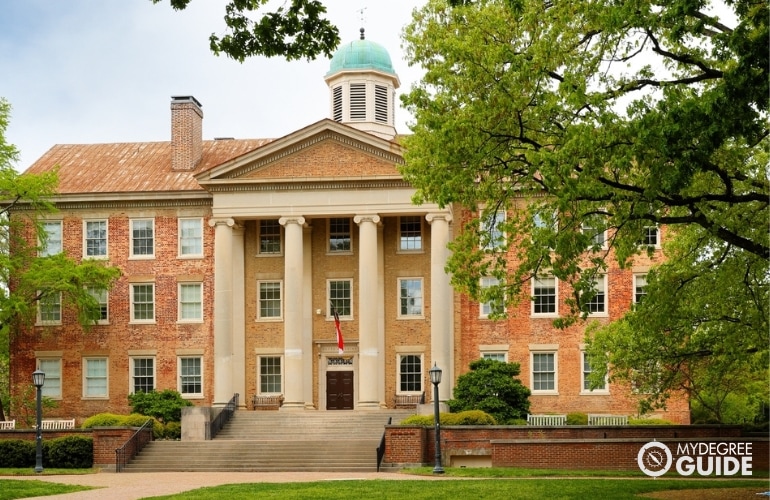
When selecting a geriatric nurse practitioner program, you may wish to refine your search to schools that are regionally accredited. You can find a list of regional accrediting agencies on the website of the Council for Higher Education Accreditation (CHEA).
Accredited schools have been evaluated against high educational standards. As a result, many licensing and certification boards require that applicants for their nurse practitioner exams have graduated from an accredited institution. If you wish to pursue a doctorate, such as a PhD in Gerontology online, many programs will only recognize course credits and degrees from accredited colleges and universities.
Plus, many employers specifically request AGNP candidates who have received an accredited education.
Adult-Gerontology Nurse Practitioner Licensure and Certifications

Becoming board certified enables you to practice as an AGNP. There are several certifications you can pursue after graduating from a geriatric NP program.
These certifications are offered through the American Nurses Credentialing Center:
- Adult-Gerontology Primary Care Nurse Practitioner – Board Certified (AGPCNP-BC)
- Adult-Gerontology Acute Care Nurse Practitioner – Board Certified (AGACNP-BC)
The American Academy of Nurse Practitioners offers one related certification:
- Adult-Gerontology Primary Care Nurse Practitioner (A-GNP)
Each certification’s process includes completion of an accredited graduate program, including courses in advanced physical assessment, advanced pharmacology, and advanced pathophysiology. Certification requirements also include an active nursing license and a specific number of supervised clinical hours.
Financial Aid and Scholarships

There are a range of financial assistance options available for students who qualify. When applying for need-based aid from the government, the first step is to complete the FAFSA, or Free Application for Federal Student Aid.
Many online MSN programs offer scholarships or grants for students based on academic performance, financial status, or subject of study. You may want to check with your prospective school to see if you are eligible for any of their grants or scholarships. In addition, some employers offer financial aid or tuition reimbursement for employees who are continuing their education.
Nurse Practitioner Geriatrics Professional Organizations

Once you have completed your studies to become an elderly care nurse, you may wish to apply for membership in a variety of professional organizations.
Some common choices for professional geriatric nurse practitioners include:
- American Association of Nurse Practitioners (AANP)
- American Nurses Association (ANA)
- Gerontological Advanced Practice Nurses Association (GAPNA)
Professional organizations may offer valuable benefits to their members, such as continuing education opportunities, advocacy assistance, and resources to help members grow in their careers.
What Can You Do with an MSN in Adult Gerontology Nurse Practitioner Degree?

Many who receive their MSN in Adult Gerontology choose to become board certified adult gerontology nurse practitioners (AGNPs) in acute care or primary care. They can work in various types of healthcare facilities, including hospitals, care centers, and doctor’s offices.
Others choose to pursue opportunities in education, instructing other nurses or creating programs to educate communities or families on topics regarding healthcare for the older population. Some advocate for the elderly through social work or research, using their knowledge to improve the health and wellness of our aging population.
Some nurse practitioners also pursue leadership positions in healthcare facilities, working as directors of nursing or facility administrators.
What Is an Adult Gerontology Nurse Practitioner?
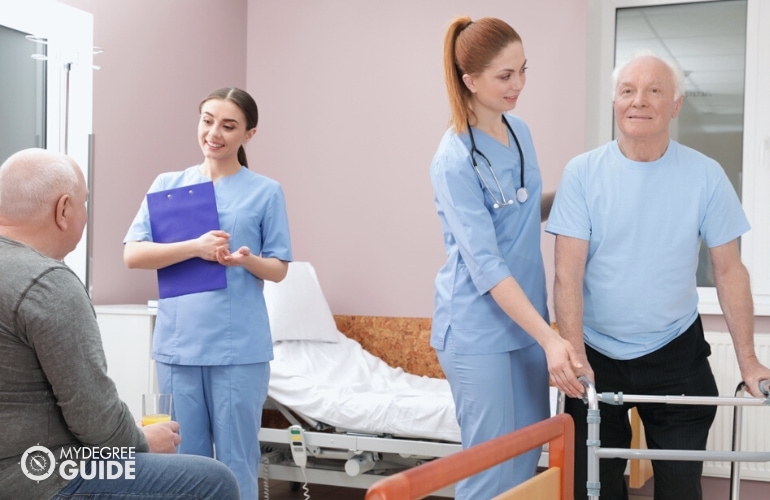
An adult gerontology nurse practitioner (AGNP) is a valuable part of a patient’s overall treatment experience. They tend to care for patients ranging from later adulthood to end of life.
Due to the unique concerns that can impact the elderly, a gerontological nurse practitioner is trained to have a clear understanding of special health concerns and treatment options for an aging population. They are also knowledgeable about the aging process itself.
As a result, they can provide more accurate care, guidance, and education to their patients, and they can make recommendations that are suitable for a patient’s current situation.
What Does a Gerontological Nurse Practitioner Do?
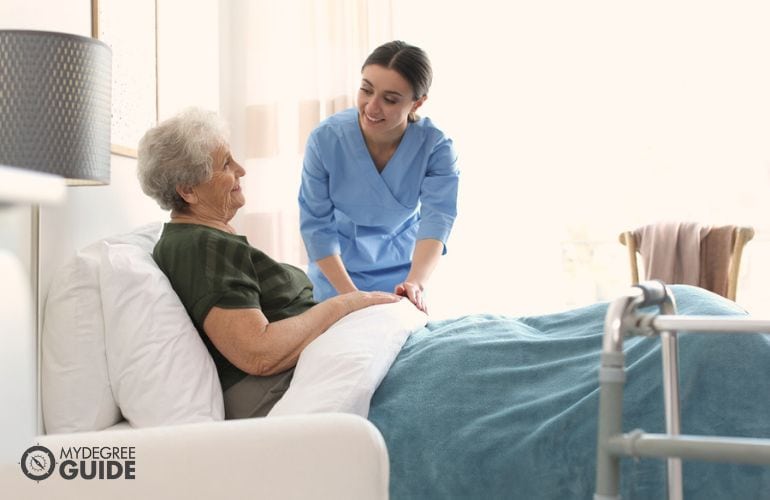
The daily duties of a gerontological nurse practitioner can vary depending on the specialty and setting in which they practice. In general, AGNPs are tasked with providing knowledgeable input on the health and wellness of their patients, establishing treatment plans, and assisting with care.
An AGNP communicates with their patients to provide education and instructions. They will also have specialized knowledge about age-related concerns and limitations, both physical and mental, so they can best assist senior patients.
How Long Does It Take to Get an MSN in AGNP Online?

The amount of time it takes to complete your MSN in AGNP often depends on the program structure. Most masters programs can be completed in 1 to 2 years with full-time study. If you select a 36 credit hour program, you may be able to graduate within 1 year, as long as you remain enrolled full-time and year-round.
If a school has a thesis requirement for MSN students or includes a significant amount of practical or clinical hours, it’ll likely take longer for you to complete your program. Part-time enrollment will also extend the length of time you’re in school.
What’s the Difference Between AGNP vs. FNP Programs?
There are several ways in which an adult gerontology nurse practitioner (AGNP) program and a family nurse practitioner (FNP) program are similar, but here are a few significant differences.
| AGNP Program | FNP Program |
|
|
While both degree programs are MSN programs that study the general care and wellness of patients, their target population and specialization are somewhat different.
Is an MSN in Adult Gerontology Nurse Practitioner Worth It?

Yes, an MSN in Adult Gerontology Nurse Practitioner is worth it for many professionals. It is essential for our society to have advanced nurses with a deep understanding of the health concerns of an aging population.
Gerontology can be a rewarding area of specialization, as nurse practitioners in this field have a knowledge of the challenges and care methods that come with advanced age. It is predicted that professionals will continue to be in demand in this field. For instance, the Bureau of Labor Statistics projects 46% job growth for nurse practitioners over the next ten years.
Getting Your MSN in Adult Gerontology Nurse Practitioner Online

If you want to advance your nursing career, getting your MSN to become an adult gerontology nurse practitioner (AGNP) is a strategic step toward a career in caring for the aging and elderly. Students not wishing to become a nurse practitioner, but still work with helping the elderly population, may want to look into masters in gerontology online or on-campus programs that a number of universities offer.
Whether you choose a patient-facing role or a role as a researcher, manager, or advocate, this field allows professionals to focus on the health concerns and situations that arise as part of the natural aging process. To get started on this path, you can take a look at accredited schools that offer MSN in AGNP programs online.
The sooner you start exploring AGNP programs, the sooner you may find the one that best aligns with your schedule and career goals.
